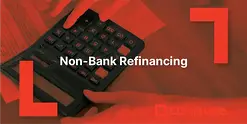What is Mortgage Refinancing? A Complete Guide for New Zealand Homeowners
 By
Trent Bradley
·
9 minute read
By
Trent Bradley
·
9 minute read

If you're a homeowner in New Zealand, you've likely heard the term "refinancing" mentioned by friends, family, or your bank. But what exactly does mortgage refinancing mean, and could it benefit your financial situation? This comprehensive guide will walk you through everything you need to know about refinancing your home loan in New Zealand.
Key Takeaways
- Mortgage refinancing replaces your existing home loan with a new one offering better terms, lower interest rates, or features better suited to current financial circumstances
- Even a 0.5% interest rate reduction can save thousands of dollars over the loan life—the most common refinancing motivation for New Zealand homeowners
- Refinancing allows accessing home equity for renovations, debt consolidation, property investment, or significant expenses through cash-out refinance or equity release
- Break fees for exiting fixed-rate mortgages early can be substantial—calculate whether potential savings outweigh upfront costs including application, legal, and valuation fees
- Debt consolidation through refinancing rolls high-interest credit cards, personal loans, or car loans into lower-rate mortgages, potentially saving hundreds monthly in interest charges
- Lenders require updated property valuations and assess creditworthiness, income stability, and loan-to-value ratios—you need sufficient equity (typically 20%+) to refinance on favorable terms
- Refinancing makes financial sense if you can recoup costs within 2-3 years through interest savings, though this depends on your long-term property ownership plans
- Changing loan terms through refinancing lets you extend terms to reduce monthly payments or shorten terms to pay off mortgages faster and save on total interest
Understanding Mortgage Refinancing
Mortgage refinancing is the process of replacing your existing home loan with a new one, either with your current lender or a different financial institution. When you refinance, you're essentially paying off your old mortgage and starting fresh with a new loan that typically offers better terms, a lower interest rate, or features that better suit your current financial circumstances.
In New Zealand, refinancing has become an increasingly popular financial strategy for homeowners looking to save money, access equity, or restructure their debt. With the country's dynamic property market and fluctuating interest rates set by the Reserve Bank of New Zealand, refinancing can offer significant opportunities for savvy homeowners.
Why Do New Zealand Homeowners Refinance?
There are numerous reasons why Kiwi homeowners choose to refinance their mortgages. Understanding these motivations can help you determine whether refinancing might be right for you.
Securing a Lower Interest Rate
The most common reason for refinancing is to secure a lower interest rate. Even a reduction of half a percentage point can translate to thousands of dollars in savings over the life of your loan. If interest rates have dropped since you took out your original mortgage, or if your financial situation has improved and you now qualify for better rates, refinancing could significantly reduce your monthly repayments and the total interest you'll pay.
Switching Between Fixed and Floating Rates
New Zealand homeowners have the flexibility to choose between fixed-rate and floating-rate mortgages, or even split their loan between the two. Market conditions change, and what made sense when you first bought your home might not be ideal today. Refinancing allows you to switch from a fixed rate to a floating rate (or vice versa) to take advantage of current market conditions or to better align with your risk tolerance.
Accessing Home Equity
As you pay down your mortgage and your property value increases, you build equity in your home. Refinancing can allow you to access this equity for various purposes, such as funding home renovations, consolidating high-interest debt, investing in additional property, or covering significant expenses like education costs. This is often referred to as a "cash-out refinance" or equity release.
Consolidating Debt
If you're carrying high-interest debt from credit cards, personal loans, or car loans, refinancing your mortgage to consolidate this debt can be a smart financial move. By rolling these debts into your home loan, you can benefit from the lower interest rates typically associated with mortgages, potentially saving hundreds of dollars each month in interest charges.
Changing Loan Terms
Your financial circumstances and goals evolve over time. Refinancing gives you the opportunity to adjust your loan term to better suit your current situation. You might choose to extend your loan term to reduce monthly payments, or shorten it to pay off your mortgage faster and save on interest over the long term.
Removing a Co-Borrower
Life events such as separation, divorce, or simply buying out a co-owner mean you might need to remove someone from your mortgage. Refinancing allows you to restructure the loan in a single name, provided you meet the lending criteria on your own.
How Does the Refinancing Process Work in New Zealand?
Understanding the refinancing process can help demystify what might seem like a complex financial transaction. Here's what you can typically expect when refinancing your mortgage in New Zealand.
Assessment and Research
The first step is evaluating your current mortgage and financial situation. Review your existing loan terms, interest rate, and remaining balance. Research current market rates and offers from various lenders. Consider your financial goals and what you hope to achieve through refinancing.
Calculating Costs and Potential Savings
Refinancing isn't free. You'll need to factor in various costs, including break fees if you're on a fixed-term loan, application fees, legal fees, and valuation costs. Calculate whether the potential savings outweigh these upfront expenses. Most financial advisors suggest that refinancing makes sense if you can recoup the costs within two to three years through interest savings.
Application Submission
Once you've chosen a lender and loan product, you'll need to complete an application. This involves providing extensive documentation, including proof of income, bank statements, identification, and details about your property and existing mortgage. Lenders will assess your application based on your creditworthiness, income stability, and the loan-to-value ratio of your property.
Property Valuation
Your lender will typically require a current valuation of your property to determine its market value. This helps them assess the risk of the loan and determine how much they're willing to lend. In some cases, lenders may accept an online valuation or automated valuation model, while others may require a full registered valuation.
Approval and Settlement
If your application is approved, you'll receive a loan offer outlining the terms and conditions. Review this carefully, ideally with a lawyer or financial advisor. Once you accept the offer, the legal process begins. Your lawyer will handle the paperwork, including discharging your old mortgage and registering the new one. Settlement typically occurs within a few weeks, though timelines can vary.
Key Considerations Before Refinancing
While refinancing can offer significant benefits, it's not always the right choice for every homeowner. Consider these important factors before making your decision.
Break Fees and Early Repayment Costs
If you're currently on a fixed-rate mortgage, you'll likely face break fees for ending your loan early. These fees can be substantial, particularly if interest rates have fallen significantly since you fixed your rate. Calculate these costs carefully to ensure refinancing still makes financial sense.
Your Credit Score and Financial Health
Lenders will assess your creditworthiness when you apply to refinance. If your credit score has declined since you took out your original mortgage, or if your financial circumstances have changed for the worse, you might not qualify for better rates or may even be declined. Check your credit report before applying and take steps to improve your score if necessary.
Loan-to-Value Ratio Requirements
Lenders in New Zealand have loan-to-value ratio restrictions that affect how much they can lend. If your property value hasn't increased significantly or if you haven't paid down much of your principal, you might not have enough equity to refinance on favorable terms. Some lenders require at least 20 percent equity, though this can vary.
Long-Term Financial Goals
Consider how refinancing fits into your broader financial strategy. If you're planning to sell your home in the near future, the costs of refinancing might outweigh the short-term benefits. Conversely, if you plan to stay in your home for many years, refinancing to a better rate could result in substantial long-term savings.
The Current Interest Rate Environment
Timing matters when refinancing. Keep an eye on interest rate trends and Reserve Bank of New Zealand announcements. If rates are falling, it might be worth waiting a bit longer before refinancing. However, trying to perfectly time the market is difficult, and waiting too long could mean missing out on good opportunities.
Is Refinancing Right for You?
Mortgage refinancing can be a powerful financial tool for New Zealand homeowners, offering opportunities to save money, access equity, and better align your home loan with your current circumstances and goals. However, it's not a one-size-fits-all solution.
The key to successful refinancing is doing your homework. Calculate the true costs and potential savings, understand your options, and consider seeking advice from a qualified mortgage broker or financial advisor who understands the New Zealand lending landscape. These professionals can help you navigate the complexities of refinancing and find the best solution for your unique situation.
At Luminate Financial Group, we specialize in helping New Zealand homeowners make informed decisions about their mortgages. Whether you're looking to reduce your interest rate, access equity, or restructure your debt, our team can guide you through the refinancing process and help you achieve your financial goals.
Remember, the best time to explore refinancing is before you actually need to make a change. By staying informed about your options and monitoring market conditions, you'll be well-positioned to act when the right opportunity presents itself.
Frequently Asked Questions
How much can I actually save by refinancing my mortgage?
Savings depend on interest rate reduction, remaining loan balance, and remaining loan term. Example: reducing rate from 6.5% to 6.0% on $400,000 remaining balance over 20 years saves approximately $190 monthly or $45,600 total interest over loan life. Larger balances and longer terms amplify savings—a 0.5% reduction on $600,000 over 25 years saves roughly $310 monthly or $93,000 total. However, deduct refinancing costs from total savings to calculate net benefit. Break fees for fixed-rate mortgages range from $1,000-$10,000+ depending on rate differential and remaining fixed term. Add application fees ($500-$1,000), legal fees ($500-$1,500), and valuation costs ($500-$800). If total costs are $5,000, you need savings exceeding this within 2-3 years for refinancing to make financial sense—achieved through $140-$210 monthly savings or higher.
What are break fees and how are they calculated?
Break fees compensate lenders for interest they'll lose when you exit fixed-rate mortgages early. Calculation compares your fixed rate to current wholesale rates for your remaining fixed period—the greater the difference and longer the remaining term, the higher the fee. If you fixed at 5.5% with 2 years remaining and wholesale rates are now 4.5%, you'll pay break fees covering the 1% difference over 24 months on your loan balance. On $400,000, this might cost $8,000-$10,000. Break fees are highest when rates have fallen significantly since you fixed. Conversely, if rates have risen since fixing, break fees are minimal or zero—some lenders even credit you. Calculate break fees before applying to refinance by contacting your current lender. Consider timing refinancing when fixed terms naturally expire to avoid these costs entirely.
Can I refinance if my property value has decreased or stayed flat?
Yes, but options may be limited. Lenders require minimum equity (typically 20% for competitive rates, though some accept 15-20% at higher rates). If property values have declined or remained flat while you've made minimal principal payments, your loan-to-value ratio may exceed lenders' requirements. Example: you purchased for $500,000 with 20% deposit ($100,000) and $400,000 mortgage. If property now values $450,000 and you've only paid principal to $390,000, your LVR is 86.7%—most lenders won't refinance without additional equity injection or accepting significantly higher rates. Options include: paying down principal to improve LVR, waiting for property values to recover, accepting higher interest rates from specialist lenders, or consolidating other debts to improve overall financial position. Some lenders offer refinancing at higher LVRs (up to 85-90%) but charge premium rates reflecting increased risk.
Should I refinance to access equity for renovations or other purposes?
Accessing equity through refinancing makes sense for value-adding purposes like property renovations that increase home value, education investments improving long-term earning capacity, or debt consolidation replacing high-interest loans with lower-rate mortgage debt. However, avoid using equity for depreciating assets (cars, holidays, lifestyle expenses) that don't provide long-term returns. When refinancing for renovations, ensure improvements add value exceeding their cost—kitchen and bathroom renovations typically return 70-100% of costs in added value, while cosmetic upgrades return less. Calculate total costs including refinancing fees and higher interest on increased loan balance. Example: accessing $50,000 equity at 6% costs $3,000 annually in interest—acceptable if renovations add $60,000+ property value but questionable for $30,000 value addition. Consider interest-only periods on equity portions to manage cash flow during renovation periods, then revert to principal-and-interest once projects complete.
How long does the refinancing process take in New Zealand?
Typical refinancing timeline spans 4-8 weeks from initial application to settlement. Week 1-2: research lenders, gather documentation (income proof, bank statements, identification), submit applications. Week 2-3: lender assessment and credit checks, property valuation ordered and completed. Week 3-4: conditional approval issued with any final requirements. Week 4-6: legal documentation prepared, existing mortgage discharge arranged, new mortgage registration processed. Week 6-8: final settlement and fund transfer. Timeline varies based on application complexity, lender processing capacity, property valuation requirements, and legal documentation speed. Straightforward refinancing with same lender might complete in 3-4 weeks, while switching lenders or complex situations extend to 8-10 weeks. Expedite process by preparing comprehensive documentation upfront, responding promptly to lender requests, engaging experienced lawyers familiar with refinancing, and avoiding application during peak periods (pre-Christmas, end of financial year).
When is the best time to refinance my mortgage?
Best refinancing timing combines multiple favorable factors: your fixed-rate term naturally expires (avoiding break fees), interest rates have declined meaningfully since you last fixed (0.5%+ reduction justifies costs), property values have increased improving your LVR and negotiating position, your credit score and income have improved qualifying you for better rates, you've identified specific equity needs (renovations, debt consolidation) making cash-out refinancing valuable, or legislative changes (like interest deductibility rules) create strategic opportunities. However, avoid trying to perfectly time the market—waiting for absolute lowest rates often means missing good opportunities as rates fluctuate. If current refinancing delivers meaningful savings (2-3 year payback on costs) and aligns with financial goals, proceed rather than hoping for perfect conditions. Monitor Reserve Bank announcements and economic indicators suggesting rate trends, but act on fundamentally sound refinancing opportunities rather than speculating on future rate movements.
Ready to explore your refinancing options? Contact Luminate Financial Group today for a no-obligation consultation with one of our mortgage specialists. We'll help you determine whether refinancing makes sense for your situation and guide you through every step of the process.

Trent Bradley
Trent Bradley is a New Zealand financial advisor specializing in property-backed finance and investment consulting. With over 26 years of experience running his mortgage broking business, he has helped wholesale investors access high-yield property-backed loan opportunities. For the past 12 years, Trent has led Luminate Finance, a New Zealand finance company dedicated to connecting investors with secure property investment solutions.
































